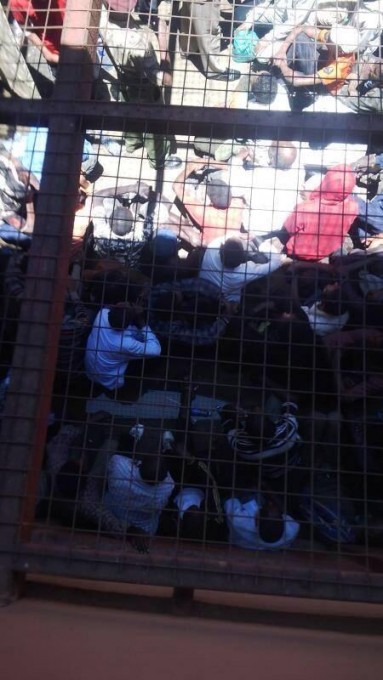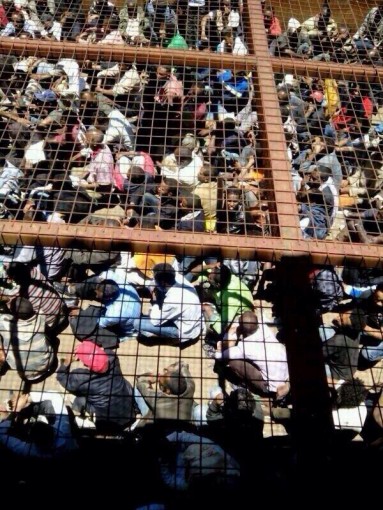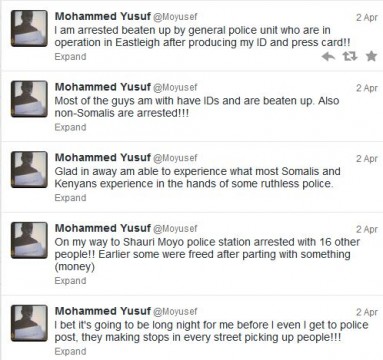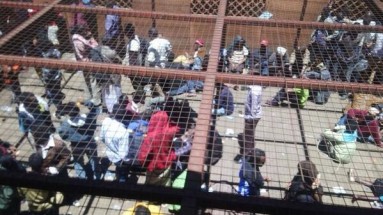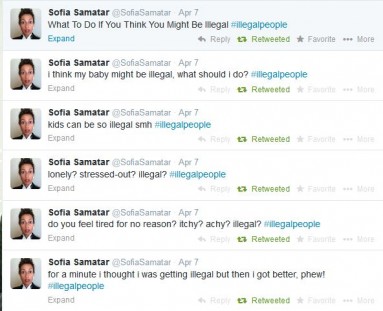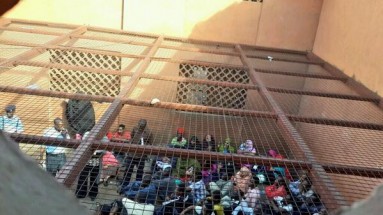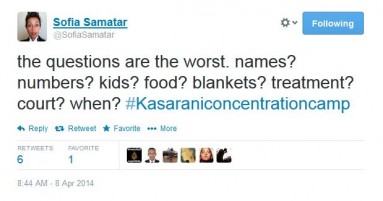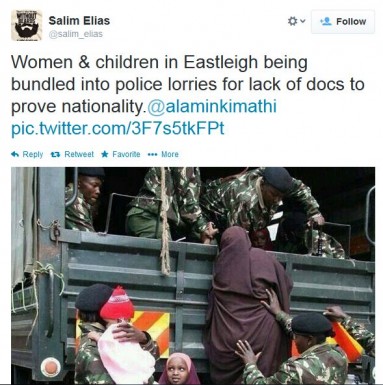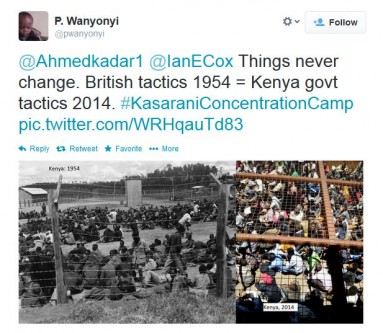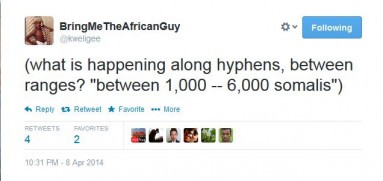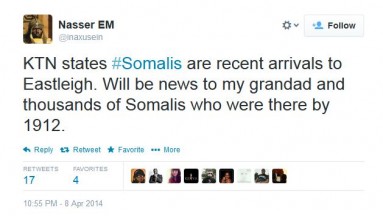Strangers are not simply those who are not known in this dwelling, but those who are, in their very proximity, already recognized as not belonging, as being out of place.
--Sara Ahmed, Strange Encounters
Daily Nation: "Police have arrested 657 suspects in Eastleigh, Nairobi following Monday night terror attack that left six people dead."
Somalianewsroom: In one shockingly tweeted photo, a group was shown en masse in a cage, prompting a commentator to ask “Gorme xoloo noqoney?” - When did we become livestock?
Kenya is Sliding Down a Slippery Path: "Kenya is rapidly becoming a rogue state, and it seems there is nothing that the country’s leadership can do about it. County officials and Cabinet secretaries are issuing orders that violate the Constitution and the laws of the land, yet they are not reprimanded or brought to book."
“The government has sent security agencies in Eastleigh and they are killing and robbing residents,” said former deputy speaker of the National Assembly Farah Maalim...The Somali community occupies the largest area in the country and yet it is treated the worst. The innocent are being arrested and their identity cards mutilated,” Mr Shidiye said."
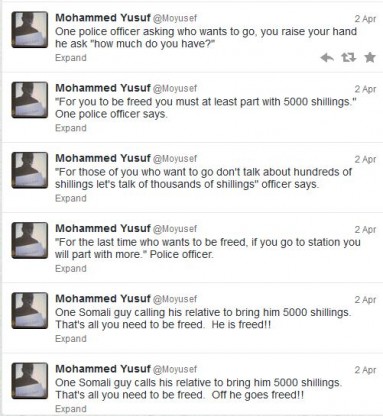 Almanar: "Kenyan police on Saturday arrested some 500 suspects in Nairobi's mainly Somali neighborhood of Eastleigh."
Almanar: "Kenyan police on Saturday arrested some 500 suspects in Nairobi's mainly Somali neighborhood of Eastleigh."
Global Post: "Six people died in this neighborhood last Monday, when three explosions tore through two restaurants and a clinic at rush hour. More than 600 people were arrested the following day. But that's business as usual in Eastleigh, a Somali-dominated suburb of the Kenyan capital."
samira sawlani, "Kasarani-venue for presidential inauguration,celebration of 50yrs independence, this?":
AllAfrica: "Police on Tuesday, declared the Safaricom Kasarani Stadium a no-go zone for humanitarian organizations"
"Prisoner of my Identity": It has been a shocking 3days for me as Kenyan of Somali identity.
Alertnet: "The United Nations has yet to access more than 1,000 Somalis who have been arrested in an anti-terrorist operation in Nairobi, the majority held in a stadium that some have dubbed a 'concentration camp.'"
Somalis: The Kenya Police Cash Cow:
when I see Kenyans cheering the police crackdown in Eastleigh I cringe in pain. Any sane person would support an operation to rid criminals from our midst. But I can bet with my life that the operation in Eastliegh will not rid us of any criminal. It is just a means for the police to extort money from both the criminals and many innocent. Have you ever asked yourself why the police are always “trigger happy” to conduct swoops in Eastleigh and Northern Kenya? It is all about the money and the perceived status of Somalis as lesser citizens. In Baragoi, 40 police officers were massacred in a single day. Nothing was done. In northern Kenya, one officer is killed and that justifies the massacre of locals and collective punishment.
Most of those who were arrested paid for their freedom. The criminals would be the first ones to pay up because they have financiers. Many people were not arrested because they knew what they were expected to do. They paid up before”tufike mbele”. I know a guy who paid kshs 20,000 despite having all the requisite documents to show his citizenship. Most of those in the concentration camps in Kasarani are the poor who could not afford to bribe their way out.
What happens when we make people illegal? What is it to determine a certain space of humanity exists outside the law and, thus, must be dealt with outside the law? I keep thinking about the term “illegal immmigrants” and the dehumanization that it brings about. As if somehow there is a space where we can move people and do to them as we will.
We.
"While there is an overwhelming belief on both a governmental and societal level that Kenyan Muslims are mobilizing attacks in large numbers against their own country, history simply does not support the assertion."
"Nearly 2,000 Somalis detained as Kenya tries to purge al-Shabaab"
Granny looking for two babies lost after police raids:
Consider, for instance, the ongoing “crackdown,” “lockdown,” “security operation” being carried out in Eastleigh. Mainstream reporting has claimed that Eastleigh is being reclaimed “by Kenya,” identifying Somali residents as “suspects,” “foreigners,” and “terror threats.” Xenophobia is one way to frame these accusations, but it fails to capture the ideological and affective labor of war on terror frames that deny suspects any recognition as right-bearing subjects. War on terror frames augment and intensify the Kenyan state’s ongoing war against Somalis, helping, as well, to legitimate this war within a global sphere dedicated to “fighting terror.” Note, for instance, that “foreign envoys” are cited as affirming their support “in eliminating terror threats in the country.” (The statement is so vague as to be meaningless, even as its very vagueness can be marshaled to support the government’s actions.)
To “support . . . eliminating terror threats” in this context requires unseeing, unhearing, and uncaring about those framed as creating or, in this case, bearing terror in their very identities, histories, cultures, and relationships. To be Somali in Kenya now is to be a terrorist, to be suspected of being a terrorist, or to be suspected of having ties to terrorism. Twitter chatter accuses Somalis in Eastleigh of “harboring” terrorists. Those speaking against the state’s actions—its violations of constitutionally-guaranteed rights and multiple human rights—are framed as “terrorist sympathizers.”
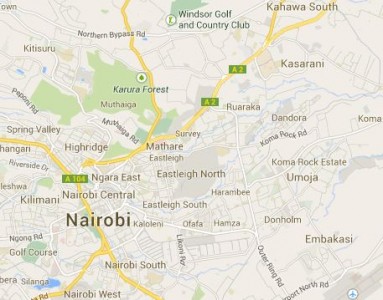 BBC: "About 2,000 people have been arrested over the past week in the capital, Nairobi, a Somali diplomat said."
BBC: "About 2,000 people have been arrested over the past week in the capital, Nairobi, a Somali diplomat said."
VOANews: "Somalis in Kenya say police are systematically soliciting bribes during an ongoing crackdown on suspected illegal immigrants."
Members of Nairobi's Kenyan-Somali community share stories of fear and discrimination:
"The other communities, they cannot differentiate us. For example, during the night time the police just come and take the people to the police station"
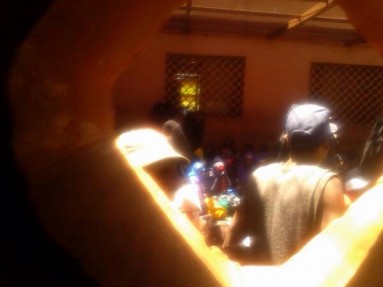 International Business Times: "More than 3,000 suspects have been arrested in Kenya in four days of counter-terrorism operations following Islamist terror attacks across the capital of Nairobi.The majority of those arrested are of Somali origin or thought to be linked to radical Islam in some form."
International Business Times: "More than 3,000 suspects have been arrested in Kenya in four days of counter-terrorism operations following Islamist terror attacks across the capital of Nairobi.The majority of those arrested are of Somali origin or thought to be linked to radical Islam in some form."
"The same govt. arresting somalis for not having identification has a history of denying them identification documents." -@kweligee
Wall Street Journal: "Some 3,000 People Rounded Up Since Saturday in Crackdown of Somali Residents"
Because I come to Eastleigh—and Somalis via Eastleigh—through bio-medicine, through my father’s emergency calls in the middle of the night, his joy when life thrived, his anxieties when life faltered, his sorrow when life ended; because I understand Eastleigh—and Somalis via Eastleigh—through bio-medical struggles to “make live,” to prolong health, to “make generations”; because I come to Eastleigh—and Somalis via Eastleigh—through the culture-bridging practices demonstrated by my father’s practice, practices that made palpable the ethics of care, emphasizing collectivity-making as a desire for others to thrive, I am struggling to understand how Eastleigh—and Somalis via Eastleigh—has become available for genocidal imaginations.
"The police chief has dubbed this “operation sanitize” and the media as usual in Kenya has a penchant for rather crude and unconscionable fascist statements towards Somali, Somalia and everything Somali, Kenyan ethnicity notwithstanding. Chime in the police who have dubbed Somalis ATM machines. The Kenyan Defense Force is in Somalia exerting its right to military voyeurism; the current vogue in Africa as usual at the behest of America’s Africa Command. Ask anyone in Eastleigh, the densely Somali populated area, if they can remember any year before or after the collapse of Somalia where there has not been a Musako (mass arrest)."
In the past, despite suffering multiple high profile terrorist attacks, Kenya avoided the Western-funded "War on Terror" despite receiving military funding from the US. That policy dramatically shifted in October 2011 when Kenya sent its troops to Somalia to fight the al-Shabab, the Somalia-based al-Qaeda affiliated group, following the group's alleged cross-border kidnapping of Western tourists and aid workers. By sending its troops to Somalia, Kenya lost its distinctive regional profile as the only country whose military never went to war with any of its neighbours.
This had two consequences. The first was that al-Shabab explicitly targeted Kenya for retribution. Since Kenya intervened in Somalia, there have been a total of 30 attacks involving grenades or improvised explosive devices. This succession of relatively minor incidents preluded the attack on the upscale Westgate shopping mall on September 21, 2013.
The second consequence was to reinforce Kenya's explicitly prominent role in the War on Terror in the region. Domestically, the face of the aggressive counter-terrorism posture was the enhanced role of the Anti-Terrorism Police Unit (ATPU) and the passage of an anti-terrorism bill in 2002.
This legislation was passed one year after Kenya's intervention in Somalia started in 2011. The passage of the law saw an uptick in the collective profiling of Muslims, and specifically Somalis. While the demonisation of the Somalis has a long history, under the counter-terrorism rubric the community has become the security forces' focal point. For example, after the recent blast in the Nairobi suburb of Eastleigh, the police arrested over 600 Somalis.
Additionally, the passage of the bill coincided with an upswing in extrajudicial killings by the police, especially in the coastal city of Mombasa.
Shailja Patel, "Banality of evil. Monotony of suffering. Police go thug on media at 5:45":
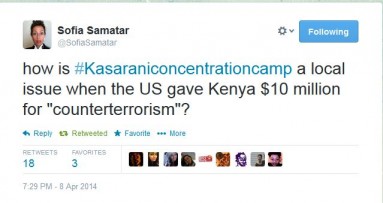 "Kenya, the United States, and Terrorism"
"Kenya, the United States, and Terrorism"
In Strange Encounters, Sara Ahmed describes how a body is recognized as a stranger. How a society is conditioned to accept a certain body as one that belongs, and any other body as strange. The strange, she argues, has been put in our minds to mean the dangerous. All the way from those horrible movies where the aliens would always come to take over the world to the idea that somehow a different person in the neighbourhood would be a robber. This creates an “us” and, invariably, a “them.”
In Kenya it is extremely easy to identify a person who does not “belong” in a certain space. We have a created a very rigid definition of who a Kenyan is that anyone who does not directly fit that description can be spotted a mile away. And, even within the people that are Kenyan in the strict societal definition, the class divide is very easy to spot. There is a hunching, a hiding that the people who do not belong in a certain space have been taught to carry out. To try and go back into themselves, stay out of the way of others. As if somehow granting these individuals the ‘privilege’ to be in ‘our’ space should be enough.
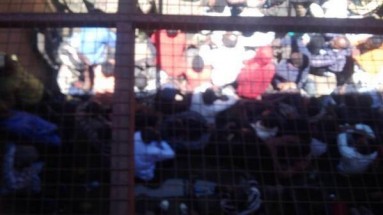 Shailja Patel: "Kenyan wars on Somali bodies: Westgate to Wagalla to Garissa to Isiolo"
Shailja Patel: "Kenyan wars on Somali bodies: Westgate to Wagalla to Garissa to Isiolo"
- September 2013 - a lamentation of mourners: war comes home to Nairobi
- March 2013 - Ethiopia and Kenya help dismember Somalia
- December 2012 - Kenya police unleashed 10 weeks of hell on Somali refugees
- October 2011 - warplanes are the new sky: Kenya shatters herself in Somalia
- Kenyan writers warn ‘all Kenyans will pay’ for invasion of Somalia
- the US warned Kenya in 2009 not to invade Somalia
- as much as 110 million barrels of oil and gas off the coast of Somalia
- the road to Westgate: the genealogy of Kenya’s occupation of Somalia
- Wagalla 1984: massacre of 5,000 Kenyan Somalis
- Garissa 1980: massacre of 300-plus Kenyan Somalis
- 1963-67: Shifta war and the mass graves of Isiolo
- trauma, brain chemistry and the forgetting pill
Violence has become normalized, acceptable, desirable even. It has become a way to build the nation by constantly defining ourselves in terms of opposition to one another. Kenyanness is constantly recreated by acts of violence. Thus it becomes the height of patriotism to call for a war with Uganda over a tiny piece of rock in Lake Victoria. And unpatriotic to question the actions of the government in Somalia or in a shopping mall in Nairobi.
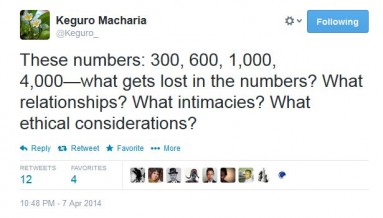 Security Swoop Suspects Held Under Deplorable Conditions At Gigiri Police Station:
Security Swoop Suspects Held Under Deplorable Conditions At Gigiri Police Station:
What's it like to be a Somali in Kenya:
The Kenyan government has very much suspended, through the rule of exception, the rights of Kenyan Muslims. There have been running battles between the historically disenfranchised Muslim citizens who inhabit the coastal region, and the state security apparatus, such as the extrajudicial killings by mysterious death squads, violent forays into mosques in Mombasa, and the ransacking of Eastleigh. The marquee terrorist lurking within an otherwise pristine Kenyan landscape are all of Kenya’s Muslim inhabitants. The reactionary islamphobia targeting Muslims by the government, with either tacit silence or vociferous approval similar to post-9/11 America’s unrelenting patriotic jingoism and xenophobia, became the unquestionable position for everyone, especially the fourth estate.
The hold over image of the pirate from the War on Terror is the media’s very own mythology, this latter day anachronistic African figure in the form of a Somali. Add to this the frequent usage of the terms terrorist and warlord, all serving to make it difficult to even extricate the human from the Somali refugee, in a land that is fraught with overly deterministic mythologies about ethnicities in general. The media is aware of its part in the reportage of these very same ethnic mythologies and the part this played in the violent post-2008 election mayhem in Kenya, and all agreed to be extremely cautious when it came to the very same mythologies. However, in the case of their fellow citizens who are Somali, it seems this does not apply. The unfortunate and often dehumanizing myths predicated on grouping an entire people as one of these three things are entirely opportune to render the Somali without any form of humanity.
Death Squads in Kenya’s Shadow War on Shabaab Sympathizers
Hiiran: "They arrest even those of us who have national identification cards only because we are Kenyan Somalis. They only listen to you when you start bargaining on how much money you have to be released," said Kaltumo Ahmed, a mother of 5 children...The Kenya authorities have ordered all Somali refugees living in towns to move into designated camps. However, human rights group condemned the decision calling it unlawful and undignified..Mama Kaltumo Ahmed complained that their citizenship is disregarded and said that the police call them "Somali ni Somali tu!" literally meaning "A Somali is always Somali" regardless of which country he belongs to ; be it Kenya or Somalia. This phrase has been popular with other ethnic Kenyans when dealing with their fellow Kenyan Somalis...Throughout the week, there has been heavy police presence thoroughly engaged in full-scale operation in Eastliegh. All the usually booming business has drastically slowed down. A number of police trucks were seen driving the streets fully loaded with people arrested including breastfeeding children with their mothers...Wajir south MP Diriye Abdullahi described the attitude of the police towards the Kenyan Somalis, as "Kenyan Somalis are guilty until proven innocent!"
AllAfrica: "The United Nations High Commissioner for Refugees (UNHCR) voiced concern on Monday (April 7th) over Kenya's arrest of nearly 4,000 people, mainly Somalis, in a large-scale security operation in Nairobi's Eastleigh neighbourhood."
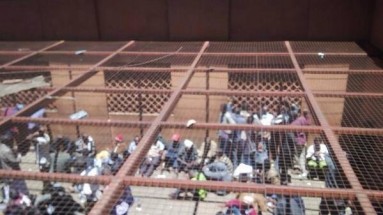 CapitalFM: "The government says 4,000 suspects have been arrested so far since the crackdown on terrorism started"
CapitalFM: "The government says 4,000 suspects have been arrested so far since the crackdown on terrorism started"
When it comes to Somalis in Kenya, what remains now is “muscle memory”: state-sanctioned physical movements and affective dispositions devoted to maintaining Somali disposability. It is an interpellative memory that trains non-Somali Kenyans how they should (un)feel about and act toward Somalis. This “muscle memory” is activated and sustained by the ongoing consolidation of identity politics—the belief and practice that one’s identity dictates and constrains one’s politics—that, again, understands Somalis as terror-bearing bodies and communities. It’s worth noting that in marking Somalis as terror-bearing, the state displaces its own violence while retroactively justifying historical violence against Somalis. In a future anterior sense, Somalis will always have been those with terror-bearing bodies, an ideological construction that sustains the “muscle memory” at work now.
 Meanwhile, Kenyan president Uhuru Kenyatta shakes hands, smiles, with Sudan's president Omar al-Bashir. Both have been indicted by the International Criminal Court for crimes against humanity. Both seem happy, relaxed.
Meanwhile, Kenyan president Uhuru Kenyatta shakes hands, smiles, with Sudan's president Omar al-Bashir. Both have been indicted by the International Criminal Court for crimes against humanity. Both seem happy, relaxed.
---
Human Rights Watch: "Kenyan police and other security agencies should stop arbitrary arrests and detentions, extortion, and other abuses against Somalis during security operations, Human Rights Watch said today."
